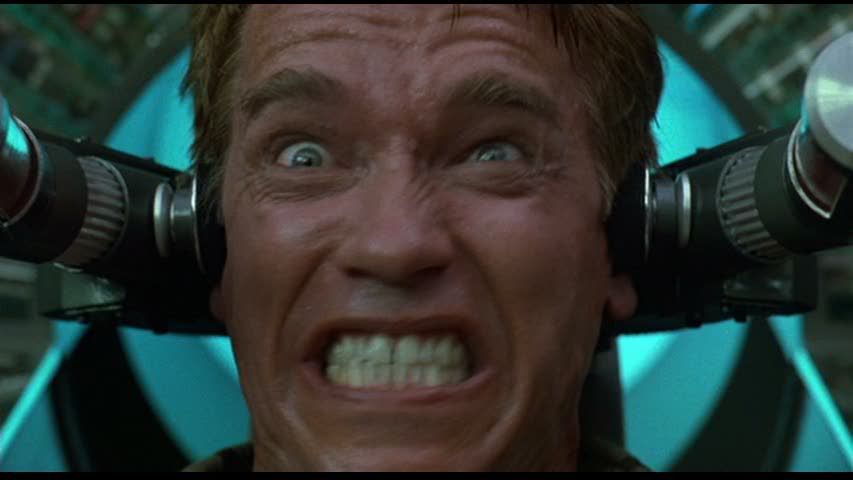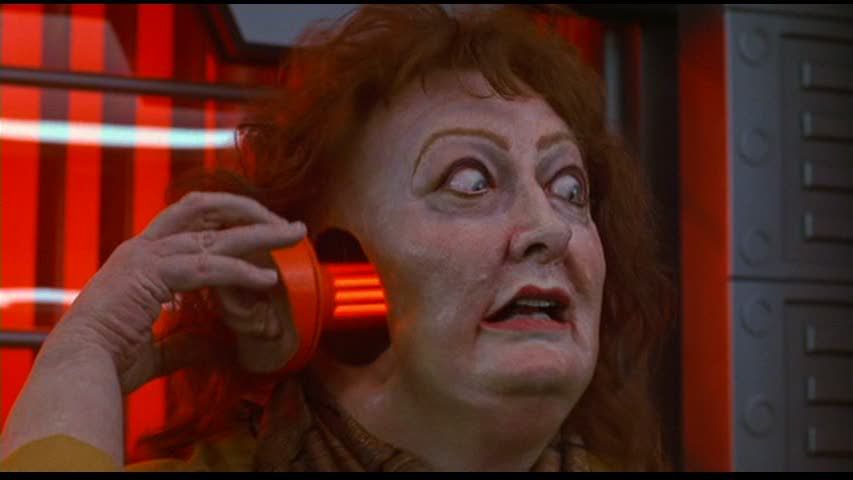
Total Recall was Paul Verhoeven's second movie in Hollywood, following up on the blunt, ultraviolent satire of RoboCop with an even loonier, more abrasive vision of totalitarian control. The film, loosely drawing its inspiration from a Philip K. Dick short story, imagines a future in which Mars has been colonized as a mining colony, producing a metal that is much in demand on Earth. The whole operation is presided over by the power-hungry Cohaagen (Ronny Cox), who maintains an iron grip on Mars by tightly controlling the air supply doled out to the inhabitants of the red planet, who live in specially controlled domes. If they want to live, they'll breath the air Cohaagen supplies — at a price, of course. It's a perfect situation for a would-be tyrant: complete control over people's very lives. His subjects need to bow to him just to survive, and there's no bargaining when it comes to a necessity like air, especially when Cohaagen's the only supplier.
As in RoboCop, Verhoeven is depicting a model for how a future authoritarian state might emerge — seizing control of natural resources, monopolizing the things people need, controlling the media to disperse only the information they want to get out, in this case propaganda about the "terrorist" rebels who resist. Not much information about Mars reaches the outside world, but one man becomes interested in the red planet when he begins obsessively dreaming the same dream over and over again, in which he is walking across the planet in a spacesuit with a mysterious woman. This man is Douglas Quaid (Arnold Schwarzenegger), and he seems to be perfectly ordinary: he's a construction worker, he's got a pretty wife, Lori (Sharon Stone), and he's never been off Earth. But his dreams persist, and he begins to want a solution to this mystery. He suspects maybe something is up. Of course, the audience knows long before he does that something's up. One of the film's most brilliant maneuvers is casting Schwarzenegger as a secret agent whose mind has been erased and his identity changed to that of an ordinary working man. This is Arnold we're talking about here, with his Bavarian lisp and his bulging, elephantine muscles. He looks absurd as a normal guy. He looks out of place in normal clothes, without a gun in his hand. He looks vaguely ridiculous kissing his wife goodbye as he leaves for work, as though he was a sitcom husband going through his daily routine. Today, he looks absurd too as a politician, but that's another story. The point is, it's obvious from the moment we see him that Douglas is not just some ordinary guy. He looks like a secret agent in disguise, a brawler, and it's no surprise when he's attacked and fluidly demolishes his assailants with a barrage of countermoves.
It turns out that someone's been messing with his mind, and his former self was a government agent working on Mars, an agent who had apparently switched sides to the rebels at some point. This is when the fun really begins. As a satire of totalitarianism, the film has its moments, but Verhoeven doesn't go nearly as far with the ideas as he did in RoboCop. But as a totally crazy, goofy sci-fi action movie, Total Recall is pretty hard to top. The explosive violence and gore of RoboCop is carried over here, and each fight scene is basically a collage of inventive ways of dispatching people, with Arnold in typical action hero mode, racing around, pounding bad guys, and tossing off his usual ludicrous one-liners. (His best, because it's simultaneously the cheesiest and the nastiest, is directed at his faux-wife Lori: "consider this a divorce.") The action scenes are occasionally clumsy, and there are several scenes where it's obvious that stunt actors are simply throwing themselves around to give the impression of a frenetic fight that just isn't actually happening, while in another scene everybody vibrates spastically to make it seem like the ground is shaking. Verhoeven's occasionally awkward with stuff like this, the big epic fight scenes so central to the film, though he also stages much of the violence with panache.
A bigger hurdle to enjoyment (except of the campy variety) is the lame dialogue and inconsistent acting. No one expects a real performance out of Schwarzenegger — the guy's most famous for playing a robot, with good reason — but the rest of the cast mostly seems to be acting down to his level. Cox especially hams it up as the villain Cohaagen, though his theatrical mustache-twirling fits the film's over-the-top B-movie tone well enough. Out of everyone in the cast, only Sharon Stone turns in an actual performance, in the small but crucial part of Lori. Her sexy-bitchy mannerisms and stop-on-a-dime transitions from seductive to icy seem now like a rehearsal for Basic Instinct's Catherine Tramell, and it's obvious why Verhoeven cast her in the part for his next film. As for Total Recall, despite its generic, pulpy dialogue and weak performances, for the most part the film is a visceral action showcase, and that's really all it tries to be. Verhoeven's political subtexts are increasingly overwhelmed by the wildly entertaining surface, which makes it a rare Verhoeven film where, in the battle between surface and subtext that always takes place in his work, the surface wins.

Still, it's a pretty entertaining surface. A lot of the credit has to go to the special effects work of Rob Bottin, who crams the film with inventive plastic and rubber effects. Most of the film's most memorable images are a result of this effects work: the bulging, cartoony eyes of Douglas as he flails about on the surface of Mars, gasping for air; the special robot suit that allows Douglas to disguise himself as a woman; the infamous three-breasted prostitute; the various deformed "freaks" who inhabit Mars' Venustown. These images have a sense of wonder, not because they seem futuristic, because they really don't, but because they're so tangible. They're not realistic by any means — in fact they're grotesque and deliberately exaggerated — but they nevertheless feel real. In that respect, the effects are reminiscent of the equally potent gore and viscera in David Cronenberg's 80s horror films, which seem like an important touchstone here. As in Cronenberg's work, the use of plastic effects rather than CGI grounds the film in a real, lived reality, even if in this case it's an absurd alternate future where three-breasted women and freakish mutants coexist, and where a mask of a woman's face can unfold itself like a flower opening to reveal Schwarzenegger inside.
These images provide much of the film's energy and vitality, particularly when Douglas finally comes face to... uh, faces with the rebel leader Kuato (Marshall Bell), a seemingly ordinary man who's hiding a baby-like tumor under his shirt, growing from his chest. This creature, which has psychic powers and leads the rebel army, is a stunningly grotesque puppet, slimy and very organic-looking. Such striking and memorably horrific images are a big part of the film's enduring appeal. Certainly, the creature and makeup effects have dated a lot better than the crude work done to create the surface of Mars itself; the red planet sometimes looks like an Earth desert tinted red, and sometimes looks like a blatant studio set with a painted backdrop. In a way, though, this artificiality only enhances the film's sense of unreality, as its protagonist tries to untangle his fractured mind. The plot races through multiple reversals and false detours, suggesting at various times that Douglas is delusional, that he's really a secret agent, that he's stuck in a virtual memory simulation gone wrong, that he just needs to swallow a red pill in order to wake up — presumably into The Matrix, which would eventually run with that particular idea. At the very end of the film, Douglas' last line even casually, jokingly suggests that maybe all of this was simply a dream, and he's about to wake up, at which point the sun flares in the distance, whiting out everything.
It's a telling little joke, because ultimately it doesn't really matter what's going on here. All of the material about multiple identities and the mind and memory are essentially red herrings, distracting from the real point. The film could be a paranoid delusion, it could all be happening in Douglas' head, but even if it isn't, it's always clear that the film is a fantasy in somebody's head, that it's unreal and ridiculous from the very beginning. It's Verhoeven's fantasy, basically, in which a capitalist nightmare — a monopoly run amok — is defeated through the efforts of freaks, outcasts and deviants. Verhoeven's touch shows through most clearly in the portrayal of these outcasts, who are both ogled as freaks — including a real dwarf mixed in amongst the makeup-enhanced mutants — and simultaneously treated as the only decent people in the film besides Douglas and his rebel girlfriend Melina (Rachel Ticotin). It's surely no coincidence that the film's rebels dwell in a section of Mars given over to sex clubs and exotic pleasures of all kinds. Even here, in probably Verhoeven's most impersonal film, the evidence of his overblown sensibility is everywhere. The film might be just a silly action movie at heart, but its anything-goes aesthetic propels the action along and gives the film its verve; Verhoeven is never content to simply show an image when he can rub it in the audience's face.







0Awesome Comments!